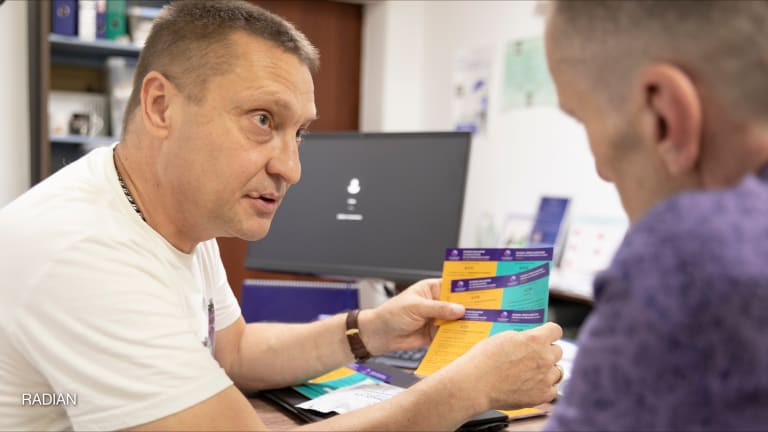'Specificity matters': What the COVID-19 response can learn from HIV/AIDS

SAN FRANCISCO — The COVID-19 response is drawing on and benefiting from many of the investments made in HIV/AIDS.
“The testing systems for COVID have layered on the existing HIV testing systems,” Nduku Kilonzo, executive director of the National Aids Control Council of Kenya, said at AIDS 2020 this week. “That includes the personnel, it includes the infrastructure, it includes everything short of the test kit itself which is testing a different virus.”
But in addition to using the health systems infrastructure built up over decades by HIV/AIDS investments, the COVID-19 response can also take notes from the strategies used to fight the 40-year-old epidemic.
Deborah Birx: PEPFAR's local partner transition 'critical' to coronavirus response
White House Coronavirus Task Force Coordinator Deborah Birx credited the platforms created by international efforts to combat AIDS with allowing low- and middle-income countries to respond to an unprecedented pandemic.
“We need to capitalize on our hard-earned lessons from the AIDS response around the importance of communities, human rights, and a multisectoral approach to build systems for health that can absorb the current COVID shock waves and future proof us against other pandemics,” said Winnie Byanyima, executive director at UNAIDS, during the event.
Engaging and empowering communities
One of the key lessons from HIV/AIDS is the importance of putting the community at the center of the response.
“We know from the HIV experience that if we don’t engage community early, and if we don’t have buy in, and if we don’t have a commitment from community, we’re not going to do well in this pandemic,” said Meg Doherty, coordinator of treatment and care in the Department of HIV/AIDS at the World Health Organization, during one of many sessions examining the impact of COVID-19 on the HIV/AIDS response.
“We’ve seen it with HIV, we’ve seen it with Ebola, and certainly we’re seeing it now with COVID 19.”
Making services more person-centred for key populations — people who inject drugs, men who have sex with men, transgender persons, sex workers, and incarcerated people — featured across many events during AIDS 2020.
“Specificity matters,” said Daouda Diouf, director of ENDA Tiers Monde, an organization based in Senegal that works to strengthen the response of the community, and particularly marginalized groups like sex workers, to HIV. “Targeting key populations, targeting the most vulnerable people, dealing with social-cultural barriers and political barriers as well as stigma and discrimination is key for effective response."
COVID-19, like tuberculosis and HIV/AIDS, thrives on inequalities, and the diseases are also linked by stigma and discrimination, Byanyima said.
“Think about a pregnant adolescent girl living with HIV who has a cough,” she said. “Think about the many layers of stigma she must overcome to get the care she needs.”
“We know from HIV that the most effective public health response that gets to the end game is also a rights-based and community-led response. They’re not in conflict at all.”
— Shannon Hader, deputy executive director, UNAIDSByanyima called on the global health community to work with non-health sectors, put people at the center of their responses, and address the social and economic determinants of health.
“We need to move away from one-size-fits-all approaches to more effective, sustainable, and people-centered approaches driven by real-time disaggregated data,” she said.
Respecting human rights
The law can help or hinder an effective public health response, and the HIV/AIDS response points to the importance of diseases being treated as public health issues, rather than criminal issues.
“Criminalization is not an evidence-based response to public health issues and often does far more harm than good,” said Edwin Bernard of the HIV Justice Network, an organization focused on ending HIV criminalization.
Criminalization disproportionately impacts the most marginalized communities in society, he said.
“Measures that are respectful of human rights and the empowering of communities are more effective than punishment and imprisonment,” Bernard added.
Bernard called the COVID-19 response a “pandemic of bad laws, policies, and overly zealous law enforcement,” noting how criminalization impinges on the relationship between people diagnosed with HIV and the health care system.
While some restrictive measures are necessary to curb the spread of COVID-19, the problem is how this power is being used and misused, said Sofia Gruskin, who directs the University of Southern California’s Institute on Inequalities in Global Health.
“Restrictions on rights for the sake of public health is acceptable and even encouraged, as long as it is the least restrictive alternative, necessary, and not imposed in an arbitrary or discriminatory manner,” she said in an email to Devex.
Shannon Hader, deputy executive director at UNAIDS, said restrictions must be evidence-based, time-limited, proportional, and ideally non-criminalized.
“We know from HIV that the most effective public health response that gets to the end game is also a rights-based and community-led response,” she said. “They’re not in conflict at all.”
Hader referenced a report from UNAIDS called “Rights in the Time of COVID-19” that draws on lessons from HIV, including the importance of engaging communities from the beginning, combating stigma and discrimination, and when restrictions are necessary, making sure there are exceptions for vulnerable groups.
When people challenged the system “that put monopolies over essential HIV medicines,” they paved the way for more equitable and accessible innovations for HIV/AIDS, Byanyima of UNAIDS said.
UNAIDS is co-leading a global campaign to make sure COVID-19 tests, vaccines, and treatments are provided free of charge globally, and she said the successes in generic production for HIV/AIDS drugs offers some lessons for how to get there.
“People must come before profits and patents,” Byanyima said.

Search for articles
Most Read
- 1
- 2
- 3
- 4
- 5








